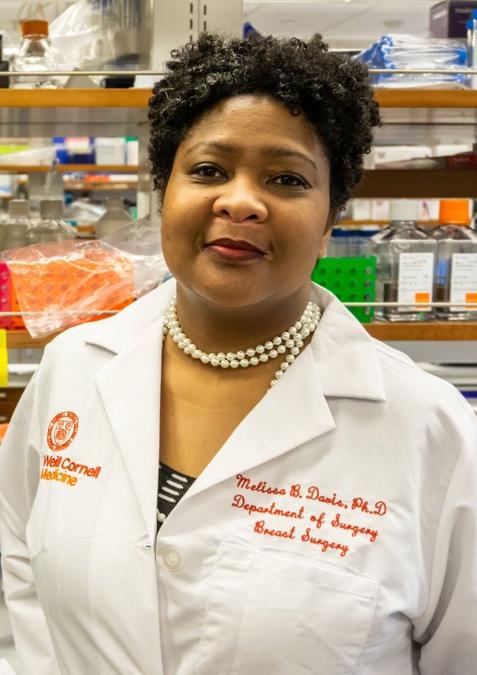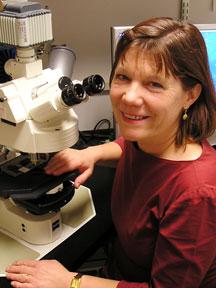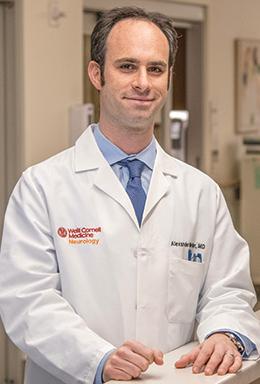Thanks to the remarkable generosity of our Board of Overseers and many other donors, WCM is able to provide one-year grants of $100,000 to support innovative research on COVID-19. Congratulations to the following faculty members for receiving the first two COVID-19 Research Grants.

Melissa Davis, Ph.D.
Assistant Professor of Cell and Developmental Biology Research in Surgery (Interim)
"COVID disparities – DARC side of SARS-Cov-2"
Patients of Black African ancestry across several countries are disproportionately affected by the COVID-19 pandemic. Despite being underrepresented among patients, individuals of Black African ancestry hospitalized with COVID-19 are more likely to fare worse in terms of symptom severity and mortality. Our study investigates the contribution of both genetic variation and obesity as key biological factors influencing these outcomes. We propose that a naturally occurring mutation in the ACKR1 gene impacts a wide range of inflammatory factors strongly influencing COVID-19 disease course. Specifically, the mutation (known as Duffy-null or Fy) causes a loss of DARC expression on red blood cells, the presence of which would otherwise serve to bind free-floating molecules that guide accumulation of inflammatory white blood cells. Thus, the Fy- mutation removes a buffering effect important to reducing systemic levels of tissue inflammation. Duffy-null is essentially ubiquitous among individuals of Sub Saharan African ancestry. Obesity, as a strong correlate of lower socioeconomic status, is also prevalent among the American- and European- residing Black African diaspora. Our study will reconcile COVID-19 clinical outcomes with inflammatory molecules, and white blood cell types found in the lungs, blood, bone and marrow. We will then analyze these data in light of demographic features such as race/ethnicity, and body mass index (a measure of obesity). Finally, we will also generate a mouse model that recapitulates the pathobiology associated both with the Fy mutation and obesity. Our study will improve our understanding of COVID-19 disparity, optimize our treatment strategies and may lead to improve therapies.

Yawei (Jenny) Yang, M.D., Ph.D.
Assistant Professor of Pathology and Laboratory Medicine
"Virologic and Immunologic Factors that affect COVID-19 Prevalence and Infection in Pregnant Women and their Neonates"
COVID-19 is a deadly global pandemic. Pregnant women make up a highly vulnerable patient population and data pertaining to the effects of COVID-19 infection throughout pregnancy and post-birth is limited. During pregnancy, the immune system is very unique and functions in a heightened state to defend the mother against severe illness, while maintaining a protected and tolerant environment for baby to grow and develop. Early COVID-19 studies indicate a low risk of transmission from mother to baby; however, it is not clear how pregnancy influences immune response to offer additional protective benefits in the presence of infection. To date, pregnant women remain as the only population undergoing universal COVID-19 testing with longitudinal care, therefore, presenting as a unique opportunity to identify a complete cohort to better study the infection and immune response. Here we propose to study the 1) prevalence, 2) how differences in the virus affect differences in infection, 3) and how the immune response and the placenta contribute to the wide range in clinical presentation in the infected patients. This comprehensive approach to study the many variables of the infection and response, on a vulnerable patient population with universal testing, will allow us to get a clearer understanding of the COVID-19 pandemic. The insights gained here will have universal impact on all patients, as these studies will impact clinical testing, elucidate potential drug targets, and guide clinical management of COVID-19 and many other infections.

Julie Magarian Blander, Ph.D.
Gladys and Roland Harriman Professor of Immunology in Medicine
"A T cell Biomarker for Protective COVID-19 Immunity"
As COVID-19 hospitalizations decline and US states prepare to return to work, many people are asking, “Am I protected from coronavirus infection?” The antibody test will identify those who recovered, but the WHO warned “there is currently no evidence that people who have recovered from COVID-19 and have antibodies are protected from a second infection”. Low antibody levels in some individuals suggest that cellular immunity, protective against viral infection, may also be important for recovery. An urgent need therefore emerges to find biomarkers of protection. Analyzing blood from WCM Healthcare workers in the NYP-WELCOME study who recovered from infection, we will isolate unique CD8 T cells that are highly protective and see pieces of virus proteins, called peptides, processed without the usual help of a protein called TAP. We know a large percentage of TAP-independent CD8 T cells use one dominant T cell receptor (TCR) to see virus peptides and kill infected cells. We will identify the dominant TCR for SARS-CoV-2 on TAP-independent CD8 T cells, and then use a specific antibody to look for it in the blood of other study participants. We will correlate the presence of this TCR with protection or disease. Because TAP-independent peptides are shared among different members of a single family of viruses, we will know whether having the TAP-independent CD8 TCR from a previous infection with common cold coronaviruses, confers pre-existing immunity to COVID-19. Identification of the TAP-independent coronavirus TCR will be a reliable biomarker for both pre-existing and post-infection immunity to COVID-19.

Heidi Stuhlmann, Ph.D.
Professor of Cell and Developmental Biology
Harvey Klein Professor of Biomedical Sciences
Professor of Cell and Developmental Biology in Pediatrics
“The Placenta as a Potential Site of SARS-CoV-2 infection and Transmission”
The recent emergence of the COVID-19 pandemic as a potentially life-threating respiratory disease and the identification of a novel coronavirus causing the disease, SARS-CoV- 2, has already taking a devastating toll on the population in the US. In New York City, 153,204 total cases, 39,635 hospitalizations, 11,460 deaths and an additional 5,213 probable deaths have been reported as of April 25, 2020. Women, and especially pregnant women, overall appear have less severe symptoms after infection with the virus. It is unknown however, if a pregnant woman that has been infected with SARS-CoV-2 can transmit the virus to the baby through the placenta. Our study will address this question by testing placentas from infected mothers for the virus. Furthermore, we will investigate if the virus may cause stroke-like lesions in placental blood vessels, as has been recently observed in several middle-aged SARS-CoV-2 positive patients.

Pengbo Zhou, Ph.D.
Professor of Pathology and Laboratory Medicine
"Small molecule G3BP1NTF2 inhibitor rewires G3BP1 to augment its anti-viral activity against SARS-CoV-2"
The current pandemic of COVID-19, a respiratory disease that has led to over five million confirmed cases and 341 thousand deaths in over 188 countries, is caused by a new coronavirus called SARS-CoV-2. FDA recently approved anti-viral drug Remdesivir on emergency basis to treat severe COVID-19 patients. However, Remdesivir clinical trials point to promising yet limited efficacy. There is an urgent need to develop more effective therapeutics against COVID-19. Recently, scientists interrogated every single SARS-CoV-2 viral protein for their binding partners in host cells. They found that the viral nucleocapsid N protein (responsible for viral RNA replication and packaging) interacts with G3BP1, a host protein that responds to stress conditions. Interestingly, G3BP1 has two distinct and opposing functions in coronavirus life cycle: (1) facilitates viral RNA replication, propagation and survival; (2) antagonizes viral infection by inducing the host innate immune response. We propose to rewire G3BP1 such that the “bad” pro-viral property is abolished while the “good” anti-viral property is preserved or strengthened. What we have in our toolbox is a small molecule inhibitor called G3N2i that we recently identified. G3N2i selectively expels nucleocapsid from G3BP1 so that it is no longer capable to promoting RNA synthesis and propagation of SARS-CoV-2. This will make more G3BP1 protein available to fuel the anti-viral immune response. We propose to test G3N2i’s ability of turning G3BP1 from a “controversial” pro- and anti-viral protein into a fierce combatant against the coronavirus. The goal is to develop G3N2i into a new therapeutic agent against COVID-19.

Alexander Merkler, M.D.
Assistant Professor of Neurology
Assistant Professor of Neuroscience
"Incidence and Risk Factors of Stroke in Patients Hospitalized with Covid-19 Infection: Derivation and Validation of a Risk Stratification Model"
Although Covid-19 infection primarily leads to respiratory symptoms, recent studies suggest that it may increase the risk of stroke and other neurological complications. However, the studies supporting an increased risk of stroke with Covid-19 were small and performed at single institutions. Therefore, we propose a large, multicenter study to determine the incidence and risk factors for stroke among patients hospitalized with Covid- 19 infection at centers participating in the American Heart Association’s population-based Cardiovascular Disease Registry. In addition, we aim to develop and validate a clinical risk stratification score as well as a computerized machine learning algorithm to help identify high-risk individuals for stroke among patients hospitalized with Covid-19 infection. We plan to make these tools publicly available through the use of online calculators in order to aid physicians in their risk assessments and clinical decision making. This proposal therefore seeks to improve physicians ability to identify which patients with Covid-19 are at risk for stroke so they can be monitored closely and targeted through evidence-based interventions.

Robert Peck, M.D., MS
Associate Professor of Medicine
Associate Professor of Pediatrics
"Chronic Kidney Complications of COVID–19 in a Cohort of HIV-infected on HIV-uninfected African Adults"
COVID-19 continues to spread in poor populations. The coronavirus that causes COVID-19 attacks not only the lungs, but also the heart and kidneys. In fact, problems of the kidneys may be the most common symptom of COVID-19. Half of patients with COVID-19 have some type of kidney problem when they are initially seen by a doctor. We do not yet know if these kidney problems will quickly heal or if they will turn into long-term health issues for people who get COVID-19. Understanding long-term kidney effects related to COVID-19 will be very important for doctors treating people who have had COVID-19. This will be particularly important for people of African ancestry around the world, since this population is already more likely to have kidney problems. Because of this, we propose to study long-term kidney problems in people with COVID-19 in our ongoing research in Tanzania. We have already received funding from the National Institutes of Health to determine the percentage of our research participants who get COVID-19. For the current proposal, we will build on this ongoing study by measuring kidney function with both standard tests used by doctors as well as newer research tests that will enable us to identify the site of the kidney injury. Our long-term goal is to apply for a larger grant to study the best ways to prevent and/or treat heart and kidney problems caused by COVID-19.

Erica Phillips, M.D., MS
Associate Professor of Clinical Medicine
"The Contributions of Socio-Behavioral Factors to disparities in the COVID 19 pandemic"
Coronavirus disease 2019 (COVID-19) has caused an outbreak on a scale of global proportion. In New York City, the epicenter of the pandemic, COVID-19 has disproportionately affected low-income neighborhoods and Hispanics and non-Hispanic Blacks. While this may be due to higher rates of underlying illness in these communities, several other factors may also have contributed to differences in COVID-19 exposure. Understanding the role that each of these factors plays, especially those involving socio-behavioral risks, is critical if we are to develop a vaccine program that protects the most vulnerable. This study aims to understand how the social determinants of health, more specifically social cohesion and capital contribute to the unequal distribution of COVID-19 occurrence across NYC. Individuals ages 18 and older who were evaluated for COVID-19 symptoms between March 1 and May 15, 2020, within the NewYork Presbyterian-Weill Cornell Medicine (NYP) will be randomly selected as study participants. Data from the electronic medical record system, public data sources, and a survey will be utilized to compare the socio-behavioral, biological and environmental risk factors of participants subsequently hospitalized to those who were not, and to determine the contribution of each to differences in hospitalizations seen between racial/ethnic groups.
